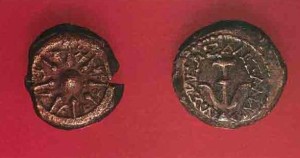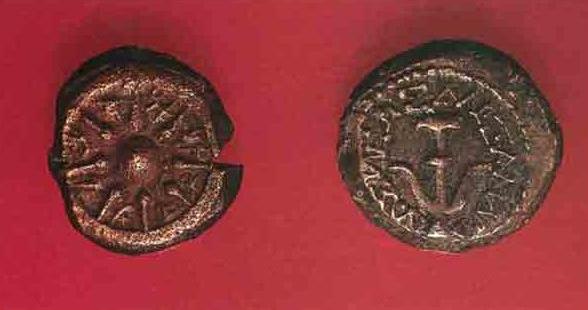 Alexander Janneus (103-76 B.C.E.) cruelly defeated his enemies and expanded the boundaries of the Hasmonean state. But his people revolted against him in a violent revolt which he cruelly suppressed.
Alexander Janneus (103-76 B.C.E.) cruelly defeated his enemies and expanded the boundaries of the Hasmonean state. But his people revolted against him in a violent revolt which he cruelly suppressed.
(356) When Alexander was delivered from his fear of Ptolemy, 44 he immediately made an expedition against Celesyria. 45 He also took Gadara after a siege of ten months. He then took Amathus, a very strong fortress belonging to the inhabitants beyond the Jordan where Theodorus, the son of Zeno, 46 kept his chief and most precious treasures. This man fell unexpectedly upon the Jews and killed ten thousand of them and seized Alexander’s baggage. (357) Yet this misfortune did not terrify Alexander. Instead he made an expedition against the maritime parts of the country, Raphia and Anthedon (the name of which king Herod afterwards changed to Agrippas), and took even that by force. (358) But when Alexander saw that Ptolemy had returned from Gaza to Cyprus, and his mother Cleopatra had returned to Egypt, he grew angry at the people of Gaza because they had invited Ptolemy to assist them. Therefore, he besieged their city and ravaged their country. (359) But Apollodotus, the general of the army of Gaza, fell upon the camp of the Jews by night with two thousand foreign and ten thousand of his own forces. While the night lasted, the Gazans prevailed because the enemy was made to believe that it was Ptolemy who had attacked them. But when daylight appeared and that mistake was corrected, and the Jews knew the truth of the matter, they came back again and fell upon the Gazans and killed about a thousand of them.
(360) But since the Gazans stoutly resisted them and would not yield for either their lack of supplies nor because of the great multitude that were killed (for they would rather suffer any hardship whatever than come under the power of their enemies), Aretas, king of the Arabians, a person then very illustrious, encouraged them to go on with alacrity, and promised them that he would come to their assistance. (361) However, before he arrived, Apollodotus was killed. For his brother Lysimachus, envying him for the great reputation he had gained among the citizens, killed him and got the army together and delivered the city to Alexander. (362) When he came in, at first he acted peaceably, but afterwards set his army upon the inhabitants of Gaza and let them punish them…. Yet the Gazans were not of cowardly heart but opposed those who came to kill them, and killed as many of the Jews. (363) Some of them, when they saw themselves deserted, burned their own houses so that the enemy might get none of their spoils. Indeed, some of them, with their own hands, killed their children and their wives, having no other way but this
of avoiding slavery for them. (364) The senators, who were in all five hundred, fled to Apollo’s temple (for this attack happened to be made as they were sitting in council), but Alexander killed them. When he had totally overthrown their city, he returned to Jerusalem, having spent a year on that siege.
(372) As to Alexander, his own people revolted against him. For at a festival which was then celebrated, when he stood upon the altar and was going to sacrifice, the nation rose up against him and pelted him with citrons 47 [which they then had in their hands, because] the laws of the Jews required that at the feast of Tabernacles 48 everyone should have branches of the palm tree and citron fruits which we have elsewhere related. 49 They also reviled him as descended from a captive and therefore unworthy of his office and of sacrificing. (373) At this he flew into a rage and killed about six thousand of them. He also built a partition wall of wood around the altar and the temple. Beyond that partition it was lawful only for the priests to enter, and by this means he obstructed the people from coming to him. (374) He also maintained foreign troops of Pisidians and Cilicians, for he was at war with the Syrians and so made no use of them. He also overcame the Arabs of Moab and Gilead, and made them pay tribute. Moreover, he demolished Amathus since Theodorus dared not fight with him. (375) Then he joined battle with Obedas, king of the Arabians, and falling into an ambush in a rugged region where it was quite difficult totravel, he was thrown down into a deep valley by a multitude of camels at Gadara, 50 a village of Gilead, and hardly escaped with his life. From there he fled to Jerusalem (376) where, because of his misfortunes, the nation insulted him. He fought against them for six years and killed no fewer than fifty thousand of them. When he requested that they desist from their ill will toward him, they only hated him much more on account of what had already happened. And when he asked them what he ought to do, they all cried out that he ought to kill himself. They also sent to Demetrius Eukairos, 51 and asked him to make a league of mutual defense with them.
So Demetrius came with an army, took those who invited him, and pitched his camp near the city Shechem. Alexander, with his six thousand two hundred mercenaries and about twenty thousand Jews who were of his party, went out to meet Demetrius, who had three thousand horsemen and forty thousand footmen. (378) Now there was great activity on both sides—Demetrius trying to cause the mercenaries who were with Alexander to desert because they were Greeks, and Alexander trying to cause the Jews who were with Demetrius to desert. However, when neither of them could persuade them to do so, they engaged in battle, and Demetrius was the conqueror. All Alexander’s mercenaries were killed after they had given proof of their fidelity and courage. A great number of Demetrius’ soldiers were also killed.
Then as Alexander fled to the mountains, six thousand Jews then came to his side out of pity at the change of his fortune. Then Demetrius was afraid and withdrew from the country. Afterwards the Jews fought against Alexander and were defeated, and many died in the battles. (380) When he had shut up the most powerful of them in the city of Bethome, 52 he besieged them there. When he had taken the city and gotten the men into his power, he brought them to Jerusalem and did one of the most barbarous actions in the world to them. For as he was feasting with his concubines, in the sight of all the city, he ordered about eight hundred of them to be crucified. And while they were still alive, he ordered the throats of their children and wives to be cut before their eyes… (383) However, this barbarity seems to have been without any necessity, for which reason he bore the nickname “Thracian” (“Cossack”) among the Jews. Then the soldiers who had fought against him, being about eight thousand, ran away by night and remained fugitives the entire time that Alexander lived. Then he, being freed now from any further disturbance from them, reigned for the rest of his time in the utmost tranquility.
44. Ptolemy Lathyrus, ruler of Cyprus, who had been driven from Egypt by his mother, Cleopatra. He invaded Palestine at the beginning of Alexander Janneus’ reign. Cleopatra, however, was persuaded by her Jewish generals to come to Hyrcanus’ aid.
45. Transjordan, in this context.
46. One of a number of tyrants who ruled small territories or cities as the Seleucid Empire was declining.
47. A similar event is mentioned in M. Sukkah 4-9 where the name of the priest is not given.
48. The fall festival of Sukkot.
49. Ant. III, 245. This practice was based on traditional interpretation of Lev. 23-40. The palm and citron are known in Hebrew as lulav and etrog.
50. An alternate reading has Garada.
51. Seleucid ruler, who ruled from 96-88 B.C.E.
52.A village probably to be located in Samaria, about 10 miles northeast of Sebaste.
